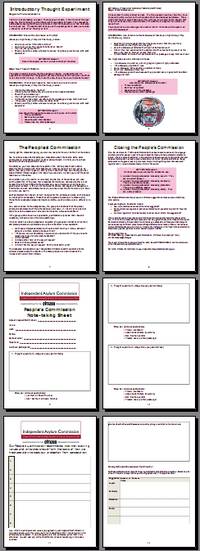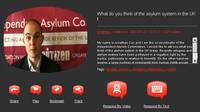[Summary: Thought experiments for consultation prove their value in complex decision making]
 Yesterday evening I took part in a 'Peoples Commission' as part of the Citizens Speak consultation on Asylum and Sanctuary in the UK organised by Leicester Intercultural Communication and Leadership School (where my wife, Rachel, is the project officer). The People's Commissions have been designed to be held by any small group of citizens – with the results of each local commission fed back into the deliberations of the Independent Asylum Commission who will be publishing a report and making recommendations for the UK Government on Asylum policy later this year.
Yesterday evening I took part in a 'Peoples Commission' as part of the Citizens Speak consultation on Asylum and Sanctuary in the UK organised by Leicester Intercultural Communication and Leadership School (where my wife, Rachel, is the project officer). The People's Commissions have been designed to be held by any small group of citizens – with the results of each local commission fed back into the deliberations of the Independent Asylum Commission who will be publishing a report and making recommendations for the UK Government on Asylum policy later this year.
To hold a commission, all that was needed was a space to meet, and a copy of the commission toolkit (and short PDF). And I was struck my how the toolkit, produced by Dr Julian Baggini, editor of The Philosophers’ Magazine, and Jonathan Cox, Co-ordinator of the Independent Asylum Commission, was a paradigmatic example of carefully planned, well structured and deceptively simple complex consultation in action.
The tookit consisted of three parts:
- Part 1 was a thought experiment. Practical philosophy in action – asking participants in a commission to consider some tough issues, but in a way that at partly strips away, partly brings into relief, the many preconceptions and predjudices (both in favour of, and against a strict Asylum system) that participants may hold on the issue of Asylum.
The thought experiment included three parts, the first of which was to discuss and conduct a straw poll on the groups responses to this scenario:
"You’re on a ship crossing an ocean. Three days out of port, in the middle of the open seas, the ship is hailed by a small boat with three people on board. They request to come aboard, saying that they are not safe in their home country and had no choice but to sneak out. The captain comes to you as the passengers and asks your advice – should he let them on the ship or not?"
Observations and Learning: Thought experiments have a really important role to play in exploring tricky issues and getting a group to establish conversations prior to tackling tricky issues 'for real'. I already find thought experiments to be useful in my own reflections and writing, but I'll be looking at where I can experiment with the use of thought experiments in consultation work in future.
- Part 2 asked participants to decide from a series of statments about asylum whether they agreed with them or disagreed. The toolkit specifically encouraged participants to check that the principles in the 'agree' pile were interally consistent – and sanctioned the rewriting/ammending of principles so that the group felt comfortable with them being in the 'agree' pile, or being consistent with other principles.
Observations and Learning: It would have been tempting in designing a toolkit for others to run a consultation to say 'Decide on the principles as they are written, and only as they are written', or to fail to provide guidance on making sure the principles were consistent. But by allowing principles to be adapted – the discussion in our group could flow much more easily – as we weren't arguing over the semantics of the given principles, but were able to adapt just one or two words across them all to make sure they represented what we really felt.
That the toolkit could allow principles to be adapted may have quite a lot to do with the way responses from People's Commissions are not feeding straight into a written report, but are feeding into the deliberation of the Independent Asylum Commission. However, having carried out 'put this list of principles / statements in order' type excercises before – and having been strict on them not being modified – I'm encouraged to rethink that in future – and to be open to the learning that comes from letting go of the components of the process a little more.
- Part 3 was a short excercise to decide upon appropriate language for describing Asylum seekers. There is not too much to say here, apart from perhaps to report that our People's Commission felt 'Sanctuary' to be a far better term than Aslyum. Also of note was that the form where responses were noted down provided clear space for extra comments alongside a record of how many people had voted for each term. Again, it would be easy to miss out a good comments box.
I'm sure that not everyone will have come away from taking part in a Citizens Speak People's Commission with as positive a view as I have (we were admitedly a small group – making discussions easier) – but I do think there is a lot of interest and to learn from in how the process was designed (and that's not just me as a Philosophy graduate trying to drum up the 'thought experiment' business, honest!)
Of course, the test of any consultation excercise is in the difference it makes – and I'll be eagerly waiting to hear how the Independent Asylum Commission to the input they'll have gained – and to hear their recommendations for future UK Asylum policy and practice.
 (The Citizen Speak process also includes a discussion space over on Friction TV.)
(The Citizen Speak process also includes a discussion space over on Friction TV.)
Thanks for posting about it. I was curious about what happens at a Peoples Commission.